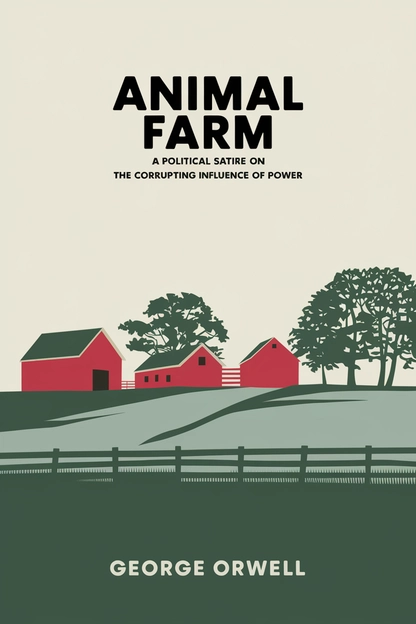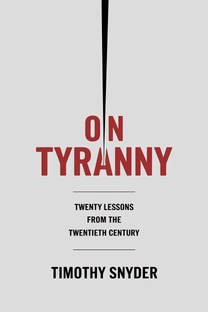
Animal Farm
A Political Satire on the Corrupting Influence of Power
by George Orwell
Brief overview
This book is a satirical story set on a farm where the animals seize power from their human owner. Through the animals’ struggles and triumphs, it paints a stark picture of how revolutionary zeal can be twisted by ambition and fear. Readers can expect a timeless cautionary tale about power dynamics, propaganda, and the fragility of freedom.
Introduction
Few stories highlight the corrupting influence of power as vividly as the tale of these farmyard animals. It begins with an inspiring dream that sparks hope for a life of dignity and equality. Over time, however, that noble vision gradually unravels, revealing the dangers of unchecked authority.
The book’s central setting—a simple farm—quickly becomes a symbol for a larger political landscape, while the characters stand in for all who strive for a better world. Yet idealistic fervor collides with everyday challenges, and subtle manipulations start eroding the foundation of the animals’ unity.
Approaching this narrative with an open mind helps uncover its layers of insight into human (and animal) nature. In the following pages, we’ll explore how the animals’ rebellion is born, the conflicts that threaten it, and how it ultimately morphs into the very thing it sought to overcome.
Think of this introduction as an invitation: brace yourself for an engaging allegory that is both darkly humorous and deeply unsettling, urging readers to consider their own roles in ensuring justice and compassion in their communities.
Seeds of Rebellion
Everything begins with a wise old boar whose final vision for a fairer society captivates the farm’s inhabitants. He encourages them to question the status quo—why their lives are defined by relentless work, small rations, and no voice in their fate. He also shares a rousing anthem of freedom, rallying them to a future free of human exploitation.
This dream galvanizes the other animals, who can’t help but recognize the injustice of their current situation. Eager to find hope in something beyond their daily drudgery, they become united by the promise that they, too, can reap the benefits of their own labor if they stand together.
Crucial to these early stirrings of discontent is the notion that all animals are—and should remain—equal. Inspired by the boar’s teachings, they establish guiding principles that prohibit adopting human vices. Here, the seeds of rebellion take root as the animals vow never to mirror the cruelty and selfishness of those who mistreat them.
What is Animal Farm about?
George Orwell’s “Animal Farm” casts a bright light on the darker realities of political power. The narrative follows a group of farm animals who overthrow their owner, only to grapple with the unsettling truth that corruption can emerge from within. Through its compact yet poignant storyline, the book underscores how propaganda, fear, and manipulation threaten the very ideals that first inspired change.
With a clear-eyed focus on accountability, the story shows how easy it can be for noble promises to crumble when self-serving leadership takes hold. Readers witness an evolving struggle for freedom layered with satire, symbolism, and social commentary. More than just an allegory, “Animal Farm” remains a relevant reminder of the vigilance required to preserve equity and protect against abuses of authority.
Review of Animal Farm
This landmark satire impresses with its direct style and symbolic depth. Orwell skillfully lays bare the process by which collective hope is gradually replaced by oppression, making the book both compelling to read and invaluable for those dissecting political power plays. Imbued with clear lessons on the fragility of truth, it speaks to the importance of continuous questioning and critical thought.
Its concise structure and familiar setting ensure the story is accessible to a wide audience, while its nuanced reflection on propaganda resonates in modern contexts. Anyone looking to understand shifts from idealism to authoritarianism will find endless insight in these pages. It is a timeless call for educated, engaged participation in any community, and is recommended for thoughtful readers seeking a potent cautionary tale.
Who should read Animal Farm?
- Political science students looking to understand the mechanisms of propaganda and authority
- Educators and book club coordinators seeking a brief yet powerful work for discussion
- Leaders or managers interested in examining the moral pitfalls of unchecked decision-making
- Readers curious about classic allegories that mirror real-world power struggles
- Anyone eager to explore how ideals can be lost when scrutiny and accountability slip away
About the author
Book summaries like Animal Farm
Why readers love Mindleap
10-Minute Book Insights
Get the core ideas from the world's best books in just 10 minutes of reading or listening.
Curated For You
Discover your next favorite book with personalized recommendations based on your interests.
AI Book ExpertNew
Chat with our AI to help find the best book for you and your goals.
Reviews of MindLeap
Love how I can get the key ideas from books in just 15 minutes! Perfect for my busy schedule and helps me decide which books to read in full.
Alex R.
The summaries are incredibly well-written and the audio feature is perfect for my commute. Such a time-saver!
Jessica M.
Great app for personal growth. The insights are clear and actionable, and I love how they capture the essence of each book.
Chris P.
The app is beautifully designed and the summaries are top-notch. Definitely worth every penny!
Sarah K.



